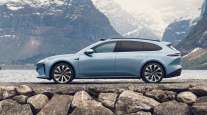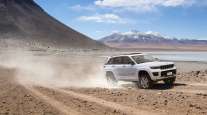Stellantis CEO Calls Small EVs a Tough Sell in US

[Stay on top of transportation news: Get TTNews in your inbox.]
Offering small cars is the wrong approach to win over truck-loving Americans skeptical of electric vehicles, according to the leader of Jeep-owner Stellantis NV.
The automaker instead is taking a more “segmented” approach in the market, pushing a variety of battery-powered offerings including pickups, SUVs and muscle cars, Chief Executive Officer Carlos Tavares said Feb. 20 in a meeting with reporters in New York.
“We are not trying to force compact cars through the mouth of U.S. consumers, because we believe at the end of the day, the lifestyle will prevail,” Tavares said. Stellantis will try “to be smarter, more focused on how we reduce the cost, including the sourcing of parts.”
The comments contrast with those of rivals such as Ford Motor Co., which revealed this month that it’s working on an inexpensive, small electric car to stem its EV losses and take on Tesla Inc. and Chinese automakers. Tesla also plans to build a cheaper, next-generation EV.
Stellantis will test its EV strategy this year with its first full battery-electric offerings for U.S. consumers, including the Jeep Recon, Jeep Wagoneer S and an electric muscle car under its Dodge brand. It also is refreshing the key Ram pickup lineup, including the all-electric Ram Revolution and the Ramcharger, a battery-powered truck with an on-board gas generator to boost range and towing capacity.
Tavares pointed to the two new trucks as an example of the segmented strategy — he expects the pure-electric Revolution to sell well on the coasts, while consumers in middle America looking for work trucks that can handle large payloads will feel more comfortable with the on-board gas generator to extend range.
The company bought a $1.1 billion stake in Chinese electric vehicle maker Zhejiang Leapmotor Technologies Ltd. in October, seeking to beef up its EV manufacturing know-how and export affordable EVs outside of China. Stellantis could reproduce Leapmotor’s EV technology outside China to build competitive EVs in regions like Italy or North America, Tavares said.
Carmakers are facing a more difficult environment with slowing growth in EV sales and pent-up demand from years of supply chain disruptions dissipating.
Want more news? Listen to today's daily briefing below or go here for more info:




